Who was Benjamin Franklin? The story behind Virtues and Inventions
America's greatest diplomat, inventor, author, and business strategist. A well-known fugire with a lesser-known story.

The only statesman to have signed all three of the United States' most historic documents - the Declaration of Independence, the Treaty of Paris, and the Constitution of the United States. A world sensation in his own time, his name still rings a bell 200 years on. His portrait of the $100 bill winks back at us.
Benjamin Franklin was a real big shot.
You'd think that everything he touched turned to gold. The story of the famous American icon has been told from many different perspectives and many books on Benjamin Franklin's daily routine and habits have managed to top the bestseller lists.
- Why are we reading about a man who in his time equated electricity with quackery and took weeks to cross the Atlantic?
- Why do we even read about other people's successes?
We are hungry for the practices, habits, and secrets of our time and of the classics of the past.
Plus the fact that the protagonist of the story became an enviable role model by swimming against the tide, by his efforts. In such cases, we think we can succeed too, if only we follow the recipe of the famous predecessor.
Benjamin Franklin is the epitome of the self-made man, the embodiment of the American dream.
Born into a poor immigrant family, he made money and influence as a printer and became a historic figure. Reading his story, we can't help but scratch our heads. Countless inventions, business successes, political appointments, and achievements.
We don't really talk about the difficulties, the failures, and the areas of life where Franklin failed to set an example. We need motivation, not facts. We want to copy the greats but ignore the sacrifices. Benjamin Franklin was a man and there were many situations in his life when he hit a huge wall. Self-improvement exercises or not, Franklin's decisions often went against common sense and the rules he set for himself.
Benjamin Franklin was not perfect.
So let's take a look behind the scenes. Let's pick out some of the lesser-known stories that give us a glimpse into Franklin's life beyond his successes. The aim of this article is not to gloat over great men, but to present their stories objectively, highlighting the role of sacrifice, hard work, and sometimes luck alongside success.
Who was Benjamin Franklin?
Benjamin Franklin inherited the fate of a man without a place. As the youngest son of a middle-class family, he could not expect much help. Each of the Franklin family's ancestors tried their luck in different cities (even crossing the Atlantic), leaving no land or property for the next generation.
Benjamin soon realized that the family name was more about entrepreneurship than heritage.
His father Josiah Franklin insisted that all 17 of his children learn a trade. He had particularly high expectations of his youngest son, seeing his talent. He hoped that his son would one day become a minister, so he sent him to preparatory school, with the ultimate goal of the university.
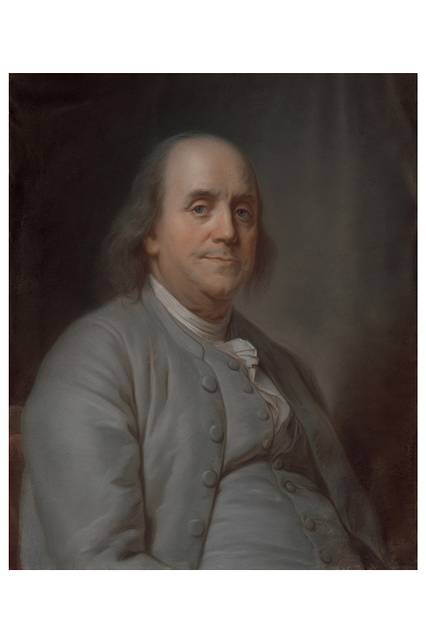
Traditional education
Franklin attended the English-language school of a schoolmaster called George Brownell for a year. He excelled in literacy but struggled with mathematics, a deficiency he did not make up later.
Benjamin Franklin was one of the most important inventors of his time, and his inventions pushed the boundaries of physics as it was then known.
What if he had studied mathematics in an academic setting? He might have risen to the Newtonian heights of science, but he might have lost the very practicality that gave us the lightning rod and the catheter.
Benjamin's traditional studies were interrupted after a year. It had nothing to do with his mathematical performance, but more to do with his father's change of attitude. Josiah realized that they didn't have enough money to educate young Franklin, so he steered his son towards the classical professions.
It's hard to imagine, but one of America's greatest statesmen did not return to the traditional schoolroom after the age of twelve. He didn't go to university because he didn't have the opportunity.
As a pupil
After school at George Brownell's, Josiah sent young Franklin to his nephew Samuel for the first time. Samuel was a knife maker, but he expected an apprenticeship fee from his relatives, which Josiah refused to hear about. So Benjamin Franklin was placed with his printer brother James.
Working at the printers, Franklin honed his writing skills. Though few people know it, Benjamin Franklin also dabbled in poetry.
"Under the influence of my father, who mocked my accomplishments and described poets as mere beggars, I did not become a poet, a very bad poet probably." - recalled Franklin
Although he gave up poetry, his penchant for putting his thoughts on paper and his incredible thirst for knowledge stayed with him throughout his life. He changed format and concentrated on essays, much more welcome in newspapers, rather than poetry.
He had access to many books in print but had much less time to read them. He often borrowed freshly printed books and spent most of the night reading them, as he had to return them in the morning.
As a self-improvement exercise, Franklin would read essays, make notes, and then, after a few days, try to rewrite the whole thing in his own words. He then compared the original version with the one he had written. His method seems to have worked, as his writings soon became a huge success.
Not believing that his brother would publish his writings, the 16-year-old Franklin invented the character of Silence Dogood and 14 of his letters appeared in his brother's newspaper, the New England Courant. The letters were slipped under the door of the printing press and delivered to James by Benjamin, who was otherwise working there. James soon understood that the widow's letters were probably from a well-read and talented writer.
When Franklin revealed his identity, his jealousy soured their relationship, and James raided every printing press in town to make sure his brother would no longer be employed.
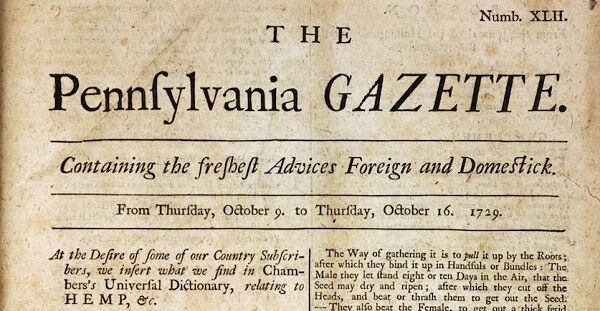
About being frugal
"Beware of small expenses, for a little leak will sink the biggest ship..."
Benjamin Franklin attributed his success to his diligence and frugality.
As a young student, he read a book on vegetarianism. He started on the diet, but it was not the moral or even the health benefits that he had in mind. His main motivation was purely financial: the new diet allowed him to buy books with half the money he got from James for food (saving on meat).
This frugality paid off later. When the air around James began to thin, Benjamin decided to try his luck in Philadelphia after Boston. He paid his way by selling the books he had previously saved up and arrived in the city in September 1723, where he soon set up his printing press.
Franklin's frugality often turned to miserliness, making life difficult for his family members. When Sally's daughter had a serious suitor, Franklin's first act was to write a letter to assure the suitor that he would not expect a large dowry.
During his 15 years of absence, his wife began renovating their house, each change to which required Franklin's permission to avoid waste. With two weeks of ocean voyages and horse-drawn carriages, the renovation took several years.
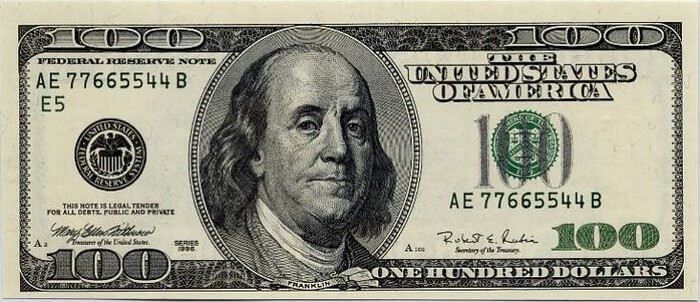
The pitfalls of overconfidence
As a printer's apprentice and later a journalist, Benjamin Franklin was caught up in a heated debate. He debated and wrote (often under pseudonyms) on subjects ranging from smallpox vaccination to Puritan values. As a teenager, the statesman, later known for his sophistication, pitted his sharp opinions against the interests of many politicians and businessmen.
In an article on the need for vaccination, Franklin disagreed with Cotton Mather, the head of the American Puritan Church. The Franklin family's long-time adversary invited Benjamin, who also loved books, to his library. During their friendly conversation, they were walking through a narrow corridor when Mather loudly exclaimed, "Stop! Stop!".
Franklin didn't understand the reason for the warning, so he hit his head on a low beam.
The Puritan minister then, as planned, gave Franklin an important piece of fatherly advice:
"Let this be a warning to you, young man, not to always wear your nose so high. Stop as you pass through the world and spare yourself many hard knocks."
The idea of mastermind groups, well known from self-improvement books, also came in part from Benjamin Franklin. To encourage mutual development among members, Franklin created a group called Junto. In the club, members discussed various philosophical, political, and business issues.
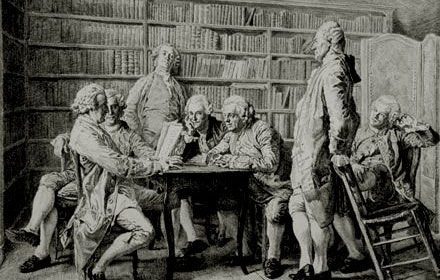
Junto was a good learning experience for Franklin. He realized that while he could win debates with fierce arguments, he could also make a lot of enemies by doing so. Reading the ancient Greek thinkers, he caught the eye of Socrates, from whom he borrowed the Socratic questioning.
He used questions to push his debating partners towards his own truth so that he won his debates without taking offense. He used the method he had learned in Junto for the rest of his life, perhaps one of the secrets of his diplomatic success.
Benjamin Franklin's family
Leaving the family nest in Boston, Franklin moved to Philadelphia, where he wanted to start his own printing business. He had saved money working for other printers, but he didn't have enough money to buy the necessary machinery.
The turning point came when the governor of Philadelphia expressed sympathy for the journalist, who had already made a name for himself for his essays. Governor Keith assured Franklin of his full support and was prepared to give a letter of recommendation for the loan of printing presses.
Buoyed by the governor's support, Franklin arranged a trip to England, but the letter of recommendation never arrived.
Deborah Reed Franklin
In the meantime, he met Deborah Read, the daughter of a Philadelphia carpenter. Before the trip to England, Franklin proposed to Deborah, but her parents refused, citing Franklin's unsettled financial situation and the impending trip to England.
Although Benjamin had promised to marry Deborah on his return from the trip, events took a turn when he arrived in the island nation.
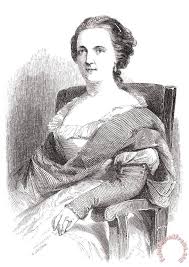
The governor's promise turned out to be a duck, leaving Franklin with no money for the return trip. She looked for work and stayed in England longer than planned. And the promise to Deborah was quickly forgotten.
Franklin amused himself with low-ranking women and then tried to find a wife who would dowry him and help him on his journey home. After several unsuccessful attempts, he had to recognize that as a young printer, he was not a good party.
He did not write to Deborah during his travels in England, who had married in the meantime. By the time Benjamin Franklin returned home to Philadelphia, Deborah's husband, who had run up huge debts, had disappeared and, according to some rumors, was no longer alive.
Franklin and Deborah began seeing each other again, but a traditional marriage was out of the question. Since the rules of the time did not allow divorce and Deborah's husband's body was never found, they married informally in 1730.
Her illegitimate child, grandchildren, and Francis
"Keep your eyes open before marriage, half shut after."
On his return from England, Benjamin Franklin had an illegitimate son, William. In his autobiography, he described the incident as a "great inconvenience", probably stemming from his affairs with "women of low rank". William was later regularly brought forward in political battles to prove Franklin's untrustworthiness.
Deborah and Benjamin lost their only legitimate son Francis, born in 1736, to smallpox at the age of 4. The pain of his loss led Franklin to scourge anti-vaccination church leaders with a scathing tone for the rest of his life and to vaccinate all his grandchildren.
Benjamin and his wife had one daughter, Sally Franklin. Franklin developed a close relationship with his daughter, but it was his granddaughter and great-granddaughter who became close to Franklin.
Franklin was not only a bad pimp but a terrible role model for William. Benjamin, like himself, could not find William a wife promising sufficient dowry. Nevertheless, William had an illegitimate son (like his father) in 1760.
Benjamin Franklin's grandson Temple was much closer to his grandfather than any of his children. He followed him to France and drank in the words of his grandfather, who was by then very popular.
Ironically, Temple, like his father and grandfather, fathered a son out of wedlock.
The illegitimate child of Benjamin Franklin's illegitimate child was Theodore Franklin.
Breaking a strange habit, Theodore left behind no legitimate or illegitimate son. Thus Theodore became the last Franklin from the great statesman's side.
Benjamin Franklin and his son
William accompanied his father to England on several occasions, eventually traveling to the island nation to study law. After the introduction of the Stamp Act, a prelude to the American War of Independence, even Benjamin Franklin was torn between loyalty to the King of England and the idea of independence for the American colonies.
When his son was appointed governor of New Jersey in 1763, William chose sides. The political differences between Benjamin Franklin and his son, who had meanwhile openly opposed England, soured the relationship between father and son. Franklin tried to sway his son to the side of the independent American states, but William stood by his position and his loyalty to England.
He was thrown into the dungeons during the American War of Independence and later fled to England. Over time, correspondence between Benjamin and William became infrequent, and then merely a cold discussion of business details.
Towards the end of his posting in France, Franklin met his son, who was already living in England. The meeting was not mentioned by Benjamin Franklin in his memoirs, but we know from the letters exchanged between William and Sally that William's debts were the only subject of the last meeting between father and son.
Temple Franklin
William's illegitimate son, Temple Franklin, is certainly worth mentioning, as he was bound to his grandfather by a thousand ties, but Benjamin Franklin was mostly bound to his grandson by a series of failures.
Like William, Franklin tried to find the ideal bride for his grandson. Although he had the mothers of his chosen girls under his thumb, his charming personality was not enough.
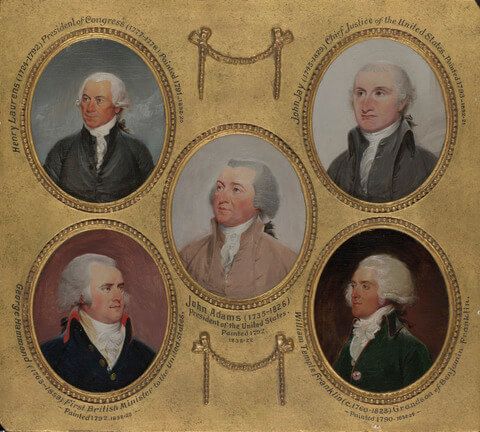
Meanwhile, Temple was assisting his grandfather as secretary, working to deepen Franco-American relations. His name was mentioned to several families, but most of them rejected him on such spurious grounds as religious differences between the families.
Temple, like his ancestors, resolved the situation and added to the list of Franklins born out of wedlock with the son of his now-married mistress.
Franklin tried to secure an overseas commission for his grandson. Towards the end of his time in France, he submitted his resignation to Congress and lobbied for a foreign assignment, bringing his grandson to the attention of officials. Congress eventually accepted Franklin's resignation, but Temple was not offered a position.
Old Franklin then decided it was time to return home. For lack of a better option, Temple headed for Pennsylvania with his grandfather.
Loose connections
Franklin was undoubtedly a social man, a regular at clubs and saloons. He founded countless societies during his life, founded the Junto in Philadelphia, the idea of the volunteer fire brigade is credited to him, and always invited intelligent partners to his chess games.
Despite all these connections and enlightened conversations, his guests were more likely to have a casual friendship with Franklin than a deep one. All this was deliberately shaped by Benjamin Franklin.
On his first trip to England, he was accompanied by a friend called Ralph James. Ralph was an educated merchant who had left his wife and son behind to seek his fortune in England. He wanted to make his fortune as a poet and to support his ambition he asked Franklin for a loan. On arriving in England, the two young men fell out and Ralph never repaid his debt.
It was then that Franklin vowed to seek the company of practical contacts rather than dreamers who could not fulfill their plans.
Franklin's marriage was also a loose, practical relationship.
The American diplomat spent 15 years away from his wife, although his engagements did not last as long. Sometimes he would spend months traveling in Europe, and other times he would amuse himself with his neighbors' wives. After Deborah suffered a stroke, her daughter wrote to Franklin urging him to return home, but he only urged her to rest. He also received a letter informing him of his wife's funeral.
Even at seventy, Franklin flirted with all women, but to tell the truth, his female friends were only lovers of his mind and soul.
In England, he had a practical relationship with his housekeeper, Mrs. Stevenson, and later he preferred to find a bride for his granddaughter in the daughters of his friends.
Findings
Whatever phenomena or theories Franklin touched upon, he sought to find their practical use, unlike many theorists. Benjamin Franklin's inventions are still used today.
Franklin stove
In the state of Pennsylvania, a lot of wood was cut down for building and heating purposes, so that after a while wood had to be sourced from as far as 100 miles away. Rather than waste low-efficiency fireplaces, Franklin wanted to reduce consumption with a stove of his own design.
Although Franklin's stove was better than earlier stoves because of its continuous radiant heater, it was not a resounding success. The smoke was channeled through a cold passage to the chimney but often did not escape from the stove due to the lack of draught.
The original design of the stove sold very little, but the improved version by David Rittenhouse was more widely used.
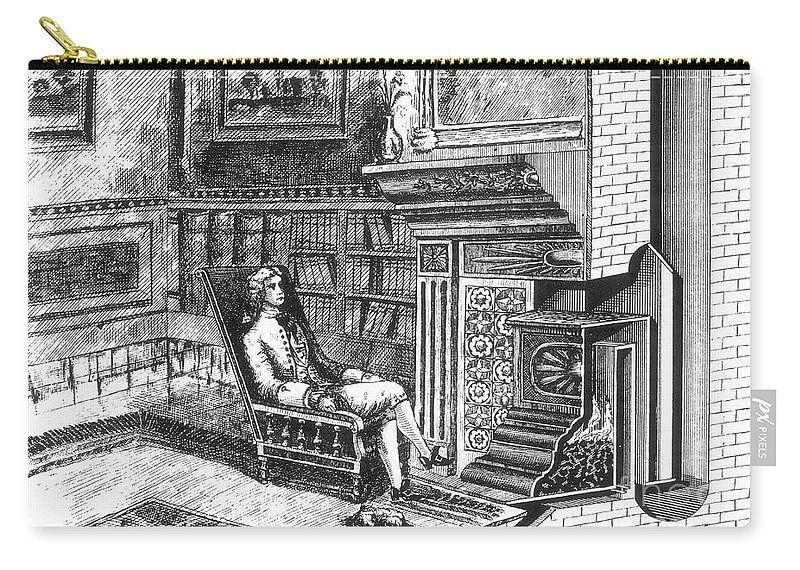
Lightning rod
Perhaps Franklin's most valuable invention was the lightning rod, the creation of which was preceded by a detailed study of electricity and a series of dangerous experiments. Thanks to his observations, Benjamin Franklin became one of the foremost experts on electricity in the 18th century.
In addition to the lightning rod, his invention is still used today to describe terms such as battery, charge, capacitor, and conductor.
The idea for the lightning rod came from an experiment with a kite that was dropped in a storm and fitted with a metal spike. Although Franklin put the process of the experiment on paper relatively early on and shared it with the scientific community, it was not until later that the dangerous venture was undertaken.
Bad rumors say that it was only after the first successful experiments that Franklin himself carried it out. Building on the lessons learned, he proposed the installation of metal bars on the roofs of houses.
Several people died in the well-documented kite experiment, which cast a bad light on the Philadelphia scientist. According to Franklin's political opponents, the idea for the lightning rod came not from Franklin but European scientists.
Besides the Franklin stove and the lightning rod, Franklin is also credited with the observation of the Gulf Stream, the bifocal lens, the glass harmonica, and the flexible catheter.
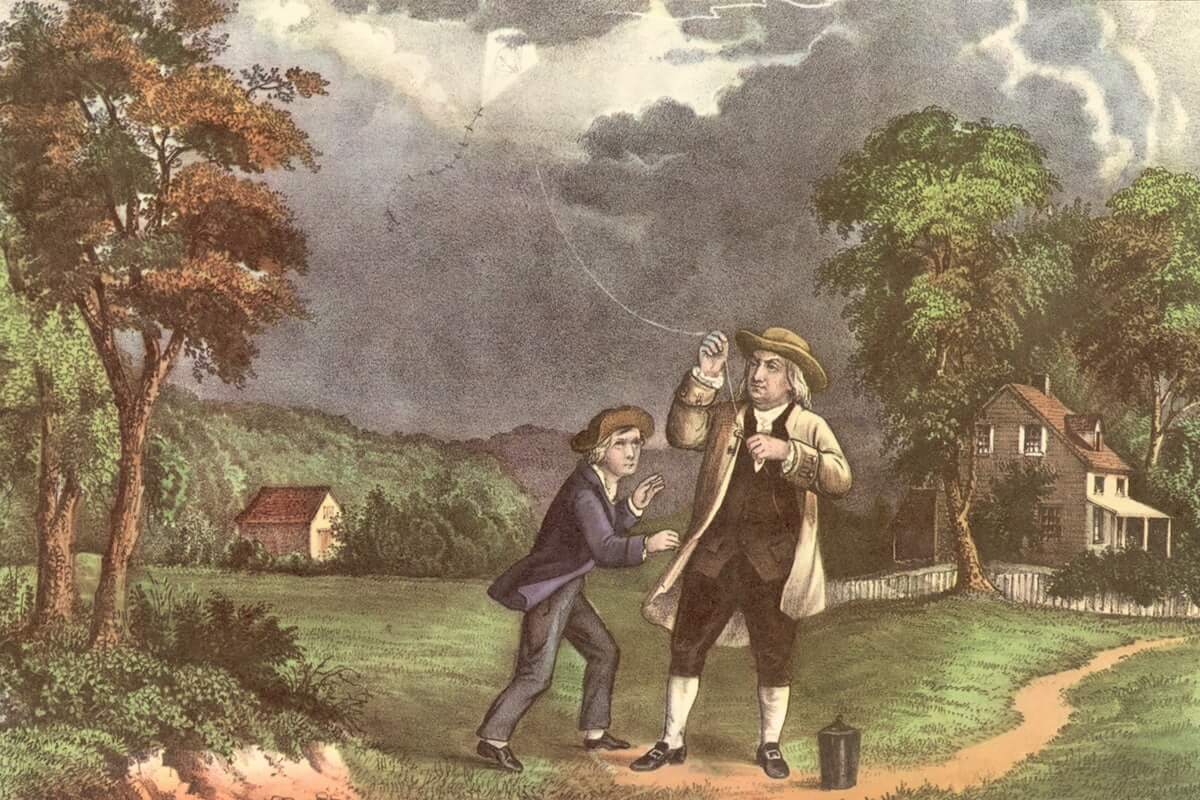
Political career
He founded a philosophical society, wrote on public issues, debated, and proposed improvements to the existing system, but until the age of 45, he put private profit before the public interest. Although he had been an officer of the Pennsylvania General Assembly since 1736, as an officer he could not take part in debates and could not influence the course of affairs in any meaningful way.
He was therefore happy to stand for election in 1764. In the heated media war, every aspect of Franklin's life was scorned by his opponents. They brought his illegitimate son to the fore, portrayed his inventions as thefts, and described him as a brash businessman who merely wanted to enrich his collection with the privileges of a lord.
In the election, Benjamin Franklin came 13th out of 14 candidates and failed to win any of the 8 seats up for grabs.
His faction decided after his defeat to make Franklin more useful as an ambassador to England. At this time, Benjamin Franklin had not yet decided whether he would support the idea of an independent American state or remain loyal to England. He felt too American in England and too English in America.
Arriving in the island nation was not an easy task for Franklin, as relations between the colonies and England began to deteriorate. The Secretary of State for the Colonies, Lord Hillsborough, had previously hosted Franklin at his estate, but on his return, he did not receive him for months.
"Hillsborough threw me aside like an orange that is no longer worth squeezing because there is no juice left in it."
As a diplomat in Paris, Franklin was received much more warmly. Amid the American War of Independence, it was not the interlocutors who worried him, but events at home. After a meeting with the French, news came that the British had taken Philadelphia.
Franklin was particularly sensitive to the news, as his house on Market Street had fallen into enemy hands. A British captain, John André, took himself into Franklin's house and stole the equipment, books, musical instruments, and even a portrait he had painted in 1759 for his electrical experiments.
As a statesman, he also benefited from Franklin's literacy and writing skills. He was involved in the creation of all three of the US's most historic documents, and his essays continued to be authoritative.
Although Benjamin Franklin dominated newspapers and behind-closed-doors discussions, he never had the gift of oratory.
"He is no speaker, nor does he seem to let politics engage his attention. He is, however, a most extraordinary man, and tells a story in a style more engaging than anything I ever heard." - summed up William Pierce
Slavery
Although Thomas Jefferson is cited as the most controversial politician on the slavery issue of the founding fathers (he owned nearly 600 slaves and as the president made the international slave trade illegal), it is worth highlighting the change in Benjamin Franklin's attitude.
Franklin owned a slave or two for most of his life, and as a young printer, he published advertisements for slave traders in his newspaper. In a letter to his mother, he condemned slavery, not for its moral but for its purely economic aspects. In 1751, Franklin sold both his slaves because he did not consider it economical to keep "black slaves".
Like most citizens of his time, Franklin considered slaves inferior and uneducable.
Franklin's views on the slave question have changed over the years. Three months before his death, he petitioned Congress to abolish slavery but was voted down by Southern politicians.
After his death, it was nearly 70 years before slavery was abolished.
Borrowed words
These days, authors of American self-improvement books are often criticized for being merely modern wrappers for the ideas of great men. With his book The 5 A.M. Club, author Robin Sharma is seen by many as writing a 21st-century version of a character from Benjamin Franklin's values: the link between early rising and wealth.
"Early to bed and early to rise, makes a man healthy, wealthy, and wise." - said Franklin.
But it was not Franklin who first articulated this wisdom. Benjamin Franklin's essays and letters drew on thousands of books he had read and wisdom from different ages.
This phrase, clearly associated with Franklin, was also inspired by an English proverb from the previous century.
Thomas Jefferson, the author of the Declaration of Independence, was similarly accused. John Adams noted with envy that the Declaration of Independence did not actually contain any new ideas and that Jefferson was merely adopting phrases already written by others.
"If nature has made any one thing less susceptible than all others of exclusive property, it is the action of the thinking power called an idea....Its peculiar character...is that no one possesses the less, because every other possesses the whole of it. He who receives an idea from me, receives instruction himself without lessening mine; as he who lights his taper at mine, receives light without darkening mine." - Jefferson observed.

Although Benjamin Franklin was an exceptional inventor, the values and ideas he promoted did not all spring from his own mind. Nor need they have been.
...and what we don't talk about
Benjamin Franklin was not only a successful businessman, founding father, inventor, and diplomat. It wasn't just the Pennsylvania Gazette, the Declaration of Independence, the lightning rod, or even the Peace of Paris that bear his name. His career was also marred by obstacles and setbacks that are seldom spoken of. The silence about failures makes us believe that Franklin was perfect.
We don't talk about the slave traders' advertisements in his newspaper, we keep silent about the diplomat who clung to the King of England almost to the last, and we don't like to hear about the case of the failed orator or the politician who failed to win an election.
Benjamin Franklin is the epitome of the American dream, the story of the poor child's triumph through talent and diligence. But Franklin was much more than that.
We've touched on some of the lesser-known stories in this article, in the interest of getting to grips with who Benjamin Franklin really was.
The aim of this series is not to tear down successful people, but to inspire thought. Next time you hear some screaming success story, ask the question:
...and what is it we're not talking about?



